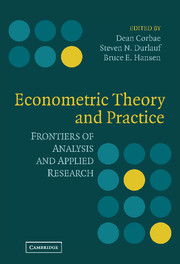Book contents
- Frontmatter
- Contents
- Preface: In Praise of a Remarkable Teacher
- Contributors
- Introduction
- PART I HIGHER-ORDER ASYMPTOTICS
- PART II IV SPECIFICATION TESTS
- 3 Specification Tests with Instrumental Variables and Rank Deficiency
- 4 Asymptotic Normality of Single-Equation Estimators for the Case with a Large Number of Weak Instruments
- 5 Improved Inference in Weakly Identified Instrumental Variables Regression
- PART III NONSTATIONARITY
- PART IV LAD AND QUANTILE REGRESSION
- PART V NONSTATIONARY PANELS
- Index
5 - Improved Inference in Weakly Identified Instrumental Variables Regression
Published online by Cambridge University Press: 05 June 2012
- Frontmatter
- Contents
- Preface: In Praise of a Remarkable Teacher
- Contributors
- Introduction
- PART I HIGHER-ORDER ASYMPTOTICS
- PART II IV SPECIFICATION TESTS
- 3 Specification Tests with Instrumental Variables and Rank Deficiency
- 4 Asymptotic Normality of Single-Equation Estimators for the Case with a Large Number of Weak Instruments
- 5 Improved Inference in Weakly Identified Instrumental Variables Regression
- PART III NONSTATIONARITY
- PART IV LAD AND QUANTILE REGRESSION
- PART V NONSTATIONARY PANELS
- Index
Summary
INTRODUCTION
It is now well known that standard asymptotic inference techniques for instrumental variable (IV) estimation may perform very poorly in the presence of weak instruments. In some circumstances, the failure is of the worst kind: false results are accompanied by reported confidence intervals that lend an appearance of great precision. That point estimates of coefficients do a poor job of telling us the true values of those coefficients is probably irremediable. After all, if an equation is poorly identified, then the data do not tell us much about the parameters of the system. In this chapter we uncover test statistics and related confidence intervals that work quite well in the sense that they lead to reasonably accurate inference when instruments are poor and that are essentially identical to the usual asymptotic IV test statistics and confidence intervals when the instruments are good. This kind of performance under weak and strong identification, respectively, is important because it discourages practitioners' natural tendency to cling to traditional methods that may give (spuriously) tight confidence bounds and erroneous inference.
Most of the previous research on inference in IV regression models with weak instruments has concentrated on the simple model with a single righthand- side, or included, endogenous variable. Unfortunately, when we consider the more general IV regression model with multiple included endogenous variables, many of the results for the single included endogenous variable model do not apply for individual structural coefficients in the more general model.
Information
- Type
- Chapter
- Information
- Econometric Theory and PracticeFrontiers of Analysis and Applied Research, pp. 125 - 164Publisher: Cambridge University PressPrint publication year: 2006
Accessibility standard: Unknown
Why this information is here
This section outlines the accessibility features of this content - including support for screen readers, full keyboard navigation and high-contrast display options. This may not be relevant for you.Accessibility Information
- 3
- Cited by
